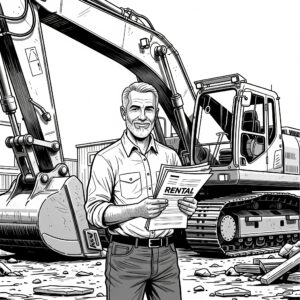Overview:
So you’ve just started your rental business, and you have some questions that need answering. We want to help you.
We’ve been helping equipment dealers find solutions for over ten years. That experience has given us valuable insight into the gaps that exist in the equipment rental industry. Starting and growing a rental business with a proper foundation is one of those “gaps.” Why? Because no one talks about it.
1. Use a Rental Contract
Before renting your equipment, it’s wise to have a rental contract/agreement. This is a legally binding document that should help protect you. If you want an example of a rental contract, most large equipment dealers will have them available on their website.
Of course, the specific phrasing may change depending on the size of your rental business, but you’ll want to build it so that you’re protected. Renting to someone you know is fine, but your equipment and friendship could be in jeopardy without the proper documents in place.
2. Solve The Insurance Problem
If you’re reading this article, you’ve probably realized that you need some help with understanding heavy equipment insurance. Self-insuring is highly dangerous for small dealers, and you’re most likely unable to get an agent to underwrite your own policy.
On the flip side, your rental customers will also have problems insuring the equipment. Auto policies do not cover heavy equipment. It may, however, be an option for the renter to put the equipment under their homeowner’s policy, but that is not guaranteed. Also, even if possible, they would be subject to rate increases in the event of a loss.
3. Educate Your Renters
Larger businesses/contractors will most likely rent from larger equipment dealers based on the selection and availability of equipment. Therefore, the clientele for small dealerships is most likely, DIYers, weekend warriors, and less experienced operators.
You’re the first line of defense for the protection of your equipment. Ensure that your customers are experienced and/or trained to operate the machine properly. An additional step is to ask detailed questions about the usage. Moving some rock with an excavator sounds pretty harmless until you find out that it’s on the side of the mountain. The more you educate your renters, the better protected you both will be.
Takeaways:
- Know Your Clientele
- Complete Equipment Operation Training
- Ask Detailed Questions




